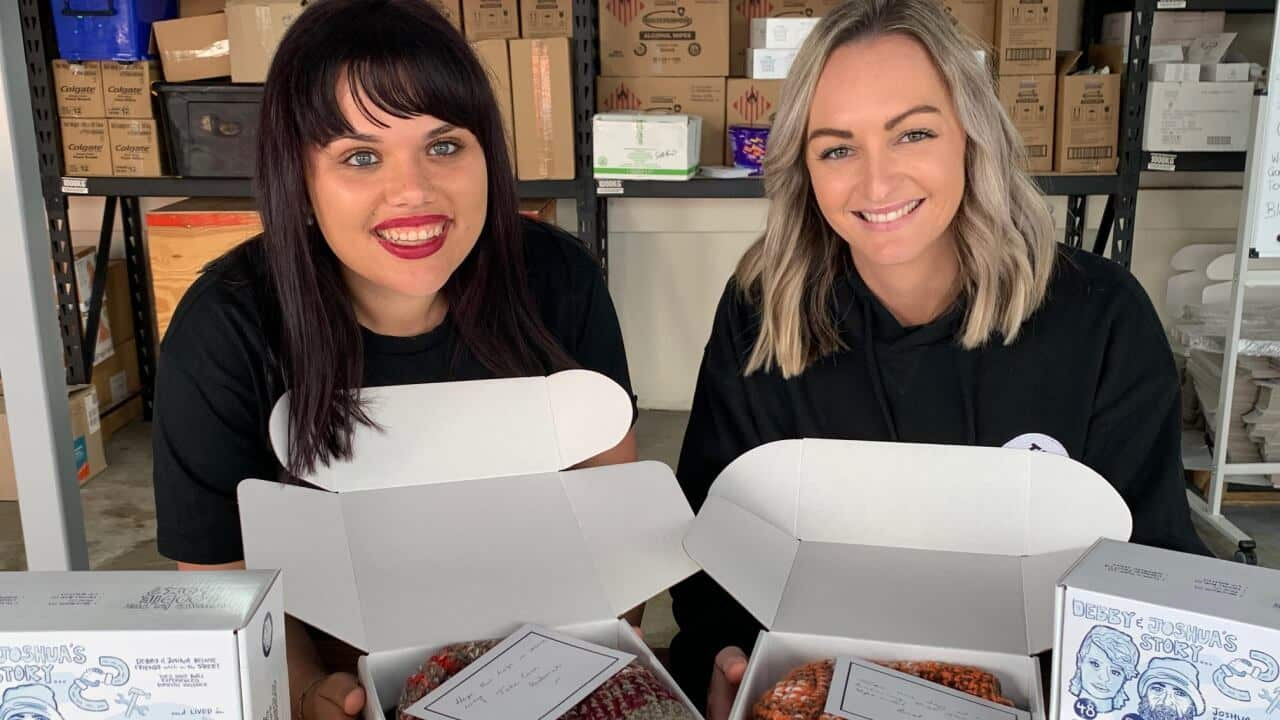Princess 'Prini' Avia is teaching a group of Samoan Australian children the colours of the rainbow in Samoan.
In a quiet room beside their local Brisbane church, the children look on as Princess slowly articulates each word.
"Moana," she says, pointing to a blue panel. "Moana," the children call back with big smiles.
“It is a great experience to see their joy at learning something that connects them to their parents and to each other,” says Princess.
The 25-year-old, who is of Samoan heritage, has come up with an idea for a Samoan language program to help children in her community develop their cultural identity. She is also training to be a lawyer. “I'm really excited to build this business and also help my family members and others to learn the language,” she says.
“I'm really excited to build this business and also help my family members and others to learn the language,” she says.

Princess Avia with some of her young students. Source: SBS Matt Guest
Princess Avia was born in New Zealand and her family migrated to Australia when she was about 12 years old.
Each Sunday, she joins hundreds of other Samoan Australians at her local church in the Brisbane suburb of Ellen Grove for a service that includes Samoan language songs.
It was there that she first became aware of her lack of understanding of the language of her family and community.
“I would be quite frustrated because I couldn't understand what they were singing about,” she says.
“And I think that really put in a desire for me to learn the Samoan language.” The turning point came when her Samoan-speaking grandmother Moira Logo, now aged 85, suffered a health scare.
The turning point came when her Samoan-speaking grandmother Moira Logo, now aged 85, suffered a health scare.

Princess Avia and her grandmother Moira Logo at church. Source: SBS Matt Guest
“I took my grandma to the hospital and I couldn't actually explain to her what the doctor was saying,” she says.
Princess now lives with her grandmother and they speak Samoan daily at home in Logan.
The area is home to more than 6,800 people of Samoan heritage and Princess is keen to share her newfound language skills with local children. “Grandma says by learning the language you learn about your culture and your traditions. It also helps you to learn to love who you are, and love others,” she says.
“Grandma says by learning the language you learn about your culture and your traditions. It also helps you to learn to love who you are, and love others,” she says.

Princess with her mother, grandmother and father in Brisbane. Source: SBS Matt Guest
These days Princess can also follow the church service in Samoan.
“When I do listen to the preacher I can take those lessons deep into my heart and know what he is talking about.”
Princess’ mother couldn’t be more pleased.
“Our elders have gained respect [for her]. They see a young person who has spoken mainly English, now learning Samoan and they are absolutely proud,” she says.
“A lot of children want to speak and identify themselves and as Samoan; it's stronger than ever,” Princess says.
New venture
Princess's idea to turn her teaching into a business called Plastique was developed with the Women's Leadership and Development Program, a national initiative funded by the Australian Government.
She is among a growing number of young women explore alternatives to full-time work during the COVID-19 pandemic.
A recent Young Women Entrepreneurship Report found 44 per cent of young women are now more interested in starting a business as a result of the global pandemic.
According to the report, the pandemic has "reinforced the instability of the workforce with many experiencing job losses … and many young women have seen online businesses thrive during the crisis".
According to the Australian Bureau of Statistics, small business registrations rose 15 per cent in the past financial year, despite the pandemic. Princess is among those taking action to turn her dream into a reality.
“I did an online workshop with the Accelerator for Enterprising Women and it was fabulous,” she says.
“We spoke with mentors, pioneers, and women that are doing great things, not just as business owners, but running different parts of a business.” Even so, female founders are still underrepresented among entrepreneurs in Australia, with just one woman for every 1.8 men.
Even so, female founders are still underrepresented among entrepreneurs in Australia, with just one woman for every 1.8 men.

Princess Avia with her mother, Helen. Source: SBS Matt Guest
Research suggests gender inequality in entrepreneurship can be traced back to the school years and early adulthood, something the Accelerator for Enterprising Women hopes to change.
“We aim to support budding young female founders just like Princess so that they can launch their business idea and turn their passion into their profession,” says spokesperson Jessica Tancred.
“The main barrier preventing young women from starting their own business is financial concerns," she says. “So we have launched a Kickstarter Challenge, offering five young female finalists the chance to share in $60,000 worth of seed capital funding.”
Voting is underway and winners will be announced in November.
Princess is among those hoping for funding to take her idea to the next level. The grant would pay for qualified teachers to develop Samoan language curricula for use in schools.
“It is something I would have loved growing up,” she says.
“My hope is that every Australian of Samoan heritage can learn the language because I know that it will change their life just like it has changed mine.”





